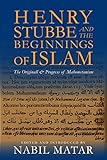Henry Stubbe and the Beginnings of Islam : The Originall & Progress of Mahometanism / ed. by Nabil Matar.
Material type: TextPublisher: New York, NY : Columbia University Press, [2013]Copyright date: ©2013Description: 1 online resource (288 p.)Content type:
TextPublisher: New York, NY : Columbia University Press, [2013]Copyright date: ©2013Description: 1 online resource (288 p.)Content type: - 9780231156646
- 9780231527361
- 297.09
- BP160
- online - DeGruyter
- Issued also in print.
| Item type | Current library | Call number | URL | Status | Notes | Barcode | |
|---|---|---|---|---|---|---|---|
 eBook
eBook
|
Biblioteca "Angelicum" Pont. Univ. S.Tommaso d'Aquino Nuvola online | online - DeGruyter (Browse shelf(Opens below)) | Online access | Not for loan (Accesso limitato) | Accesso per gli utenti autorizzati / Access for authorized users | (dgr)9780231527361 |
Browsing Biblioteca "Angelicum" Pont. Univ. S.Tommaso d'Aquino shelves, Shelving location: Nuvola online Close shelf browser (Hides shelf browser)

|

|

|

|

|

|

|
||
| online - DeGruyter In the Company of Strangers : Family and Narrative in Dickens, Conan Doyle, Joyce, and Proust / | online - DeGruyter The Secret Financial Life of Food : From Commodities Markets to Supermarkets / | online - DeGruyter Socialism Unbound : Principles, Practices, and Prospects / | online - DeGruyter Henry Stubbe and the Beginnings of Islam : The Originall & Progress of Mahometanism / | online - DeGruyter What Does a Jew Want? : On Binationalism and Other Specters / | online - DeGruyter Fantasies of the New Class : Ideologies of Professionalism in Post-World War II American Fiction / | online - DeGruyter New Perspectives on International Migration and Development / |
Frontmatter -- Contents -- Acknowledgments -- Introduction. The "Copernican Revolution" of Henry Stubbe -- The Printed and Manuscript Sources. Editorial Policy -- The Originall & Progress of Mahometanism -- Notes -- Bibliography -- Index
restricted access online access with authorization star
http://purl.org/coar/access_right/c_16ec
Henry Stubbe (1632-1676) was an extraordinary English scholar who challenged his contemporaries by writing about Islam as a monotheistic revelation in continuity with Judaism and Christianity. His major work, The Originall & Progress of Mahometanism, was the first English text to document the Prophet Muhammad's life positively, celebrate the Qur'an as a divine revelation, and praise the Muslim toleration of Christians, undermining a long legacy of European prejudice and hostility.Nabil Matar, a leading scholar of Islamic-British relations, standardizes Stubbe's text and situates it within England's theological and intellectual climate in the seventeenth century. He shows how, to draw a historical portrait of Muhammad, Stubbe embraced travelogues, Latin commentaries, studies on Jewish customs and Scripture, and, most important, Arabic chronicles, many written by medieval Christian Arabs who had lived in the midst of the Islamic polity. No European writer before or for a long time after Stubbe produced anything similar to what he wrote about Muhammad the "great Prophet," Ali the "gallant" advocate, and the "standing miracle" of the Qur'an. Stubbe's book therefore makes a unique contribution to the study of the representation of Islam in Western thought.
Issued also in print.
Mode of access: Internet via World Wide Web.
In English.
Description based on online resource; title from PDF title page (publisher's Web site, viewed 02. Mrz 2022)


